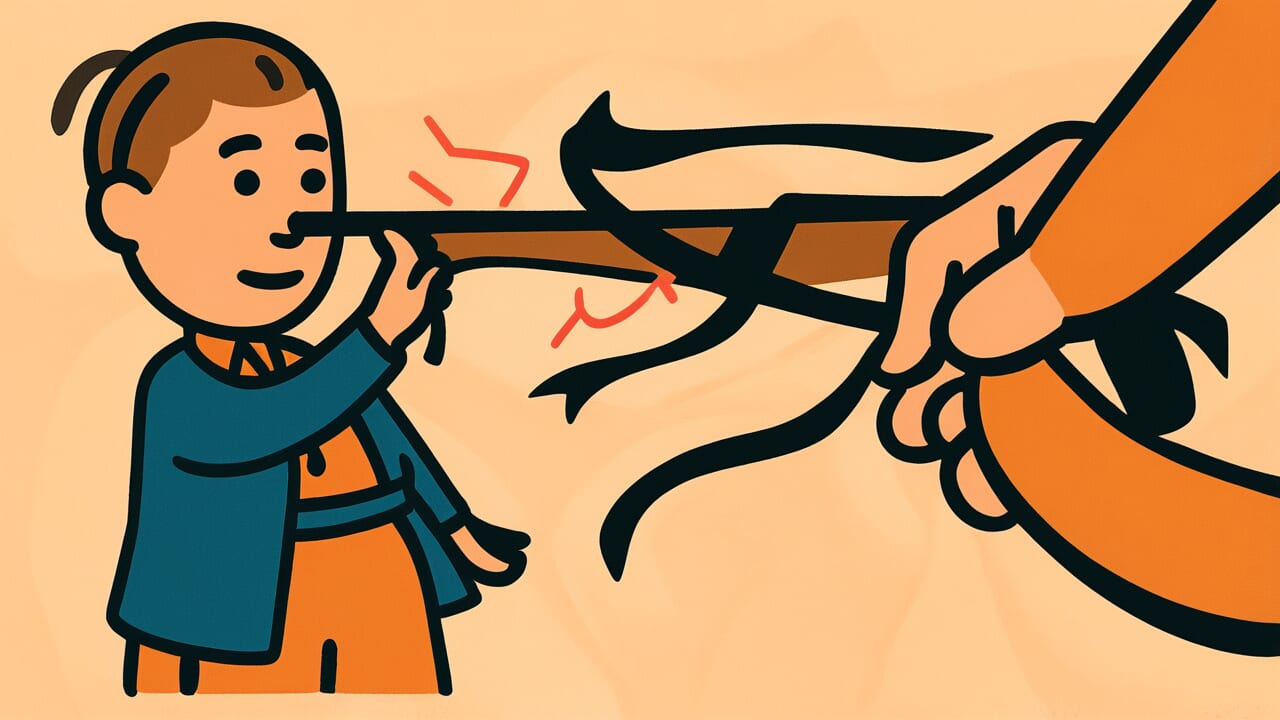How to Read “Don’t draw another’s bow”
Tayumi hiku nakare
Meaning of “Don’t draw another’s bow”
“Don’t draw another’s bow” literally warns against pulling someone else’s bow without permission. It teaches us not to intrude into other people’s domains uninvited.
This isn’t just about touching someone’s physical possessions. It’s a warning against stepping into areas that belong to others.
These areas include their work, family matters, and personal decisions. Even with good intentions, interfering without permission can cause trouble.
It can also hurt the other person’s dignity.
This teaching still applies today. We see it when people offer unsolicited advice or meddle in others’ work out of kindness.
Everyone has their own way of doing things. Respecting that is fundamental to good relationships.
This proverb conveys that timeless wisdom.
Origin and Etymology
No clear historical record identifies the exact origin of this proverb. However, the structure of the phrase reveals interesting background.
“Tayumi” literally means “another person’s bow.” “Hiku” refers to the action of drawing a bow.
“Nakare” is an ancient prohibition form meaning “must not do.”
From ancient times through the medieval period, the bow was a sacred tool for warriors. Each bow was crafted to match its user’s physique and strength.
The drawing strength varied from person to person. Drawing someone else’s bow without permission could damage it.
It could also disrupt the owner’s technique and habits. For warriors, a bow wasn’t just a weapon.
It was an extension of themselves.
This practical teaching from warrior society evolved into a universal lesson. It grew beyond the specific context of archery.
The message became: don’t interfere with what belongs to others. Don’t invade another person’s domain.
Through the concrete example of a bow, this phrase teaches about necessary boundaries between people. It speaks of the respect we owe each other.
Usage Examples
- I wanted to comment on his management style, but remembering “Don’t draw another’s bow,” I stayed silent
- I almost got involved in my friend’s family problems, but I reminded myself: “Don’t draw another’s bow”
Universal Wisdom
Humans have a curious trait. We often see other people’s situations more clearly than our own.
A friend’s romance, a colleague’s work methods, a relative’s parenting. Somehow, things outside ourselves appear clearer.
We spot problems easily and even think of solutions.
Usually, these observations come from good intentions. “I want to help them.” “I don’t want them to make mistakes.”
Such thoughts make us speak up and interfere.
“Don’t draw another’s bow” has been passed down for centuries. This happened because people have always faced this temptation.
Our ancestors learned through experience how dangerous it is to give in to this urge.
Stepping into someone else’s domain may look like kindness. But it might actually show that you don’t trust their judgment.
Others have their own lives, their own reasons, and responsibilities only they can carry.
Invisible boundaries between people are necessary. These boundaries aren’t coldness.
They’re actually expressions of deep respect for others.
This proverb teaches the most basic wisdom about relationships. It reminds us how important proper distance is.
When AI Hears This
Control engineering reveals an interesting paradox. When you increase observation and intervention to improve a system, overall performance can actually decline.
Consider a factory production line. If managers check each process too closely, workers can’t use their own judgment.
Time spent waiting for checks increases. Production efficiency drops as a result.
Think about drawing a bow. When an expert draws, muscles and joints make countless tiny adjustments unconsciously.
This is an “optimized control system” built through thousands of practice sessions.
But if someone observes and points out “your elbow angle is off by three degrees,” the archer consciously tries to fix it.
Then the balance of other connected parts gets disrupted. External observation information enters as “noise.”
It disturbs the feedback loop that was working well.
Control theory tells us that observation always involves cost and delay. Conscious human judgment lags about 0.2 seconds behind unconscious reaction.
This delay disrupts precise movements that were being adjusted in real time.
Not interfering with another’s bow makes sense. You avoid introducing unnecessary delay and noise into their internal control system.
Lessons for Today
Modern society makes other people’s lives visible through social media. We face more situations where we want to comment.
“Don’t draw another’s bow” becomes even more important in such times.
This proverb teaches the importance of trusting others. The person you worry about is also an adult walking their own path.
Even if their route seems roundabout, it might be the journey they need.
Of course, offering help when asked is important. But intruding uninvited differs from supporting someone when needed.
True kindness means respecting others’ domains while watching over them. It means being ready to help whenever they need you.
This wisdom applies at work and at home. Even when a junior colleague’s work concerns you, first respect their approach.
When you feel anxious about family members’ choices, try trusting and letting them handle it.
Such an attitude encourages others’ growth. It also protects your own peace of mind.



Comments